
I have just arrived from a wonderful trip. More than a year ago, in one of the most complex moments of the pandemic, the pandemicI needed a project that would allow me (and us) to escape a little from the difficult reality we were going through. That is how, in an unprecedented act, I signed up for the Ironman 70.3 in Hawaii.. At that time the borders were closed, I had hopefully received the first dose, there were no massive sporting events taking place and I had not yet made my debut in a triathlon. That's how risky, irrational and challenging my plan was.but I must admit that it it gave purpose to a lot of things that were going on at the time.
I shared my madness with some friends and great was my surprise when many started to follow me, sending screenshots of their registrations. The matter went beyond my circle, a whatsapp group was createda whatsapp group was created and people from other teams, from other cities, all with the same need to do something uncommon in such a difficult the same need to do something uncommon in such a difficult context (more info here). (more information about it here). More vicissitudes, less vicissitudes, the year passed and it was time to face the competition. My plan was to beat the elusive 6 hoursI felt quite prepared for it, after a lot of training, nutritional plans, mental work and experience from other races. I did everything according to planAll my efforts were on target, I felt strong, and yet I ran the worst time I've ever set for the distance. Why did that happen? Basically because I focused on everything I could control and just had to accept what I couldn't: headwind on the swim, wind and like 3 different weather conditions on the bike, hellish heat on the run, etc.
Yeah, very nice story, but what does this have to do with economics? what does this have to do with economics? You came to read about it, didn't you? Well, in spite of being on family vacation, after about 6 years without taking one, in an earthly paradise, my professional deformation did not prevent me from keeping an eye on the local and global from keeping an eye on local and global economic developments, which during the last two weeks have focused on the actions of Central Banks, the fight against inflation and the possibility of the most important economies entering into recession.. Consumer prices continue to rise, supply constraints are not improving and monetary policy is struggling to keep inflation under control.
My impression is that the work the Central Banks are doing now has little to do with controlling inflation now, or even that of the next 12 months.. I will go further, they may not even be able to do so with respect to the two-year change, which for many is the primary objective. As I could perceive from the Fed statementpress conference and the projections, the Federal Reserve's Federal Reserve today has a struggle with expectations, since, in one way or another, it is the only thing it seems to be able to control (or try to control) with macroeconomic conditions. macroeconomic conditions current macroeconomic conditions. Our Central Bank faces a similar situation, as I have commented in this same space some weeks ago. Faced with swimming against the current or the scorching heat I can do nothing, just as monetary policy can do little to control supply problems, the Central Bank can do nothing to control supply problems.the armed conflict in Europe o the confinements caused by the zero COVID policy, which are the big are the main causes of the current inflation (I am generalizing (I am generalizing, of course the interference is greater in some countries and less in others). But it can act today to maintain its credibility tomorrow, by raising rates, surprising the market and telling it that it is going to do everything possible to achieve its targets. do everything possible to ensure that its targets are met within the relevant time frame.. Expectations in the U.S. and Chile for two-year inflation are above 2% and 3%, respectively, measured under different instruments.measured under different instruments. If this situation continues and begins to permeate not only financial assets, but also people's daily decisions on contracts, readjustments, etc., de-anchoring will not be a problem. will not be a problem for inflation today., but much more serious for tomorrow's inflation.. And it would seem that this is the only career plan that central banks can execute today can execute today, disregarding (a little) contemporary price variations. Just like me, who was happy even doing 44 minutes more than I had set out to do ..